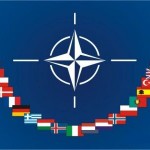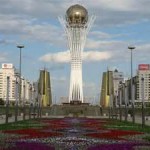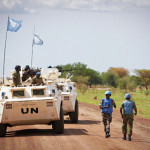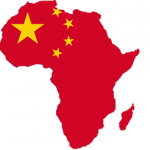(C) Kapok Tree Diplomacy. 2011. All rights reserved. Jeff Dwiggins
FREE CONTENT
Assuming that the ‘developing world’ includes the entire developing world, not just states undergoing post-conflict reconstruction (PCR), I think we must first define what Western ‘free market’ auspices are, and how might they be cultivated under Western/liberal principles.
Gilpin asserts that “Liberalism may, in fact, be defined as a doctrine and set of principles for organizing and managing a market economy in order to achieve maximum efficiency, economic growth and individual welfare” that is committed to “free markets and minimal state intervention,” “individual equality and liberty,” and the “premise … that the individual consumer, firm, or household is the basis for society” (421-422). Does this type of economy promote the stability a developing state needs?
Liberalism has its own set of empirical economic laws geared towards stability to include: comparative advantage, marginal utility, a quantity theory of money and rational choice that lead a market economy towards a “powerful tendency towards equilibrium and inherent stability” (Gilpin 422-423).
Thus, free market economics within liberalism produces growth, efficiency, stability, cooperation and even peace in the way that it brings people together with mutual interests. But what about people of different religions, cultures and ethnicities within the state? Do they have mutual interests? What about different political systems? Let’s first look at democratic political systems where we do see free market principles functioning on a regular basis.
Ikenberry takes the free market principles one step further by tying them to democracy itself and stressing the “role of human rights, multilateral institutions, and progressive political effects of economic interdependence” (58), as well as “political reciprocity, and the management of conflicts in new multilateral institutions” (59). He posits that democracies fight each other less and embrace free trade which in turn fosters economic growth (61).
Moreover, he reminds us that “prosperous neighbors are the best neighbors” (61). He points to trade’s ability to “socialize neighbors” (62) like China and promote global stability. Finally, Ikenberry points to the ability of democracy and free trade to create norms that unite shared values and reduce opportunity for conflict (63-64). Again, do various ethnic and religious groups in developing states have enough shared values for democracy and free trade to work?
In the developing world there are numerous barriers to the promotion of liberalism, free market principles and democracy. We have the political impediments of states with different economic ideologies such as communism or Marxism as in Russia. But even states like Russia and China with communist political ideologies have adopted some forms of “state capitalism” that are partly Western in orientation. We also have the issue of corruption among government elites with no transparency that pocket economic aid and export revenues to prop up their regime and do little to invest in legitimate development projects or economic diversification.
There is also the issue of whether a developing state meets the strategic national interests of powerful donor states to attract economic attention (Rwanda and Somalia). Lastly, some political regimes cannot protect their citizens, let alone protect economic and financial institutions, so the prospect of a liberal economy seems dismal without better security.
Ethnic impediments have been a challenge in places like Afghanistan and Iraq where numerous tribes and ethnic groups compete for equitable treatment within economic and financial institutions. They may have different languages and be of different races, making communication challenging. Religious impediments seen in the examples of Bosnia (Catholics, Muslims, Christians) and Iraq (Sunni vs. Shia Muslims) may also impede economic growth if free market principles are seen to favor one group over another, conflict with religious principles, or symbolize some type of domination by Westerners.
Consistent economic growth may not be possible where military and political stability is lacking. The Democratic Republic of the Congo comes to mind. Panagriya notes that political stability is needed as much as free trade measures to grow faster (20-21).The CIA Fact Book reports that in Somalia, “Due to armed attacks on and threats to humanitarian aid workers, the World Food Programme partially suspended its operations in southern Somalia in early January 2010 pending improvement in the security situation. Somalia’s arrears to the IMF have continued to grow.”
Thus, Somalia cannot even feed itself due to a lack of a stable government and the inability to control its territory. It is doomed to anarchy, at least for now. To top it off, Somalia apparently owes the IMF a lot of money. I would hate to be the one holding that note. Such loans exacerbate the problem, not help economic development. The IMF loans were done out of sequence prior to stabilization of the security and political situation. The results were predictable.
Amy Chua takes this theme a bit farther, as does Samuel Huntington. Chua notes that the adjustment to free markets in developing nations can result in a “backlash against markets that target the market-dominant minority’s wealth” (Zimbabwe), “an attack against democracy by forces favorable to the market-dominant minority” (Philippines, Kenya), or “majority supported violence aimed at eliminating a market-dominant majority” (Rwanda, Yugoslavia) (“A World on the Edge”).
Chua encourages us not to “overlook the ethnic dimension of market disparities.” She recommends wealth redistribution measures (I do not), development and implementation of civil, social and market institutions prior to full-blown democracy, additional foreign aid, and some forms of direct government intervention to correct ethnic maldistribution issues (“A World on the Edge”).
Huntington says, “the process of economic modernization and social change throughout the world are separating people from longstanding local identities” (26), and explains that “economic regionalism is increasing” (27) to bolster his claims that cultural issues will increasingly impede economic development and drive conflict in the 21st century.
Beyond cultural, ethnic, religious, political, and security impediments, we also have institutional impediments. Sometimes developing states are simply not ready for full-blown economic liberalism. These states’ internal economic infrastructure of governance, banking, regulation, financial markets, education, innovation, research and development, and domestic stability must be able to handle the greater levels of prosperity, investment and opportunity.
Ji Young Choi explains what can go wrong when capital account liberalization is done too prematurely in context to the Asian crisis of 1997. He says, “Extemal pressures on the opening of the Korean financial market played a considerable role in bringing about premature, hasty, and unprepared financial liberalization in Korea, which was one of the main causes of the financial meltdown in 1997” (10). He goes on to say, “A transition from a state-led development system to a market-oriented one is surely not an easy task and requires a much longer period of time and learning” (16).
Developing countries who want to pursue industrial and agricultural development strategies basically have three choices: (1) Private funding, (2) international economic institutions like the IMF and World Bank (WB), or (3) alternative strategies such as the bilateral deals China signs with African nations outside of the international economic institutions. A fourth choice might be the “state capitalism” practiced by China.
Regarding international assistance, Easterly points put, “Spending $2.3 trillion (measured in today’s dollars) in aid over the past five decades has left the most aid-intensive regions, like Africa, wallowing in continued stagnation; it’s fair to say this approach has not been a great success” (2005), and adds, “Economists are reasonably confident that some combination of free markets and good institutions has an excellent historical track record of achieving development” (2007: 329). His argument posits that enhanced freedoms and liberties, as well as systems that breed them, are the answer to increasing and sustaining growth rates in developing countries,
Despite the rather long laundry list of impediments listed above, I find Easterly’s argument compelling. Strong political institutions and an emphasis on the rule of law, deterring corruption and respecting property rights should be established in developing countries in order for free market principles to be effectively cultivated. We need to stay away from large loans with no accountability mechanisms or emphasis on results. “Piecemeal steps aimed at” the provision of clean water, building and maintaining roads, and creating education opportunities, as well as focusing on “division of labor and gains from specialization … inflation stabilization, financial regulation, [and] elimination of red tape” to start a business would help free markets develop (Easterly 2007: 331).
This will also help legitimize governments. ‘In the context of poverty and decline it is hard for governments to gain popular allegiance” (Collier 2004: 3). If the government is unable to suppress dissent chaos can follow, and dissent is tough to suppress in the absence of consistent and widespread economic success.
The articles by Lewis, Inglehart and Norris support the idea that even in places like the Middle East, democracy and free markets are compatible with Islamic religion, Arab culture, and diverse tribal entities. Yes, there are enough shared values. The issue is not values but one of equity in regards to financial benefits, representation, administration and leadership of the institutions – both political and economic. Practical steps can be taken to diminish these issues. Economic success in places like India, China, South Korea, and Brazil demonstrate the power of free market principles, though democracy is not a reality in China. If prosperity promotes the hunger for democracy, China may eventually succumb to democratic revolution.
Cultivating economic growth under Western ‘free market’ auspices is completely feasible in the developing world … with decent institutions embedded in the right values, political and security conditions. Democratic values can even be cultivated without full-blown democratic institutions. These values may enhance economic growth. Reinforcement of the norms and rules of the global economic system, free markets, the rule of law, state sovereignty, nondiscrimination and financial transparency as conditions of an aid package is one example. Of course, no method will work the same in every state.
Choi, J. Y. (2009). Rethinking Economic Development and the Financial Crisis in South Korea and the State in an Era of Globalization. Journal of Third World Studies , 26 (2), 203-226. Web. Academic Search Premier. Retrieved from Norwich University Library.
Chua, A. (2002). Two Faces of Globalization: A World on the Edge. Wilson Quarterly , 26 (4), 62-77. Web. 04 Apr 2010. Academic Search Premier. Retrieved at Norwich University Library.
Collier, P. (2004, October 1). Development and Conflict. Retrieved February 8, 2011, from The United Nations | Published by, The Centre for the Study of African Economies, Department of Economics, Oxford University: http://www.un.org/esa/documents/Development.and.Conflict2.pdf
Easterly, W. (2005, March 13). A Modest Proposal. The Washington Post , BW03. Web.JSTOR. Retrieved from Norwich University Library.
Easterly, W. (2007). Was Development Assistance a Mistake? The American Economic Review , 97 (2), 328-332. Web. JSTOR. Retrieved from Norwich University Library.
Gilpin, R. (1987). Three Ideologies of Political Economy. In D. J. Kaufman, J. M. Parker, P. V. Howell, G. R. Doty, & A. Jenson (Ed.), Understanding International Relations: The Value of Alternative Lenses (5th ed., pp. 419-449). West Point, NY, USA: McGraw Hill Custom Publishing.
Huntington, S. P. (1993). The Clash of Civilizations. Foreign Affairs , 72 (3), 22-49. Web. Academic Search Premier. Retrieved from Norwich University Library.
Ikenberry, J. G. (1999). Why Export Democracy? Wilson Quarterly , 23 (2), 56-65. Web. 18 Apr 2010. Academic Search Premier. Retrieved at Norwich University Library.
Inglehart, R., & Norris, P. (2003, March/April). The True Clash of Civilizations. Foreign Affairs , 62-67. Web. Academic Search Premier. Retrieved from Norwich University Library.
Lewis, B. (2009). Free at Last? Foreign Affairs , 88 (2), 77-88. Web. Academic Search Premier. Retrieved from Norwich University Library.
Panagariya, A. (2003). Think Again: International Trade. Foreign Policy (139), 20-28. Web. 20 Mar 2010. Business Source Premier. Retrieved at Norwich University Library.
The Central Intelligence Agency. (2010). Somalia. Retrieved April 6, 2010, from The CIA World Factbook: https://www.cia.gov/library/publications/the-world-factbook/geos/so.html





Leave a Reply